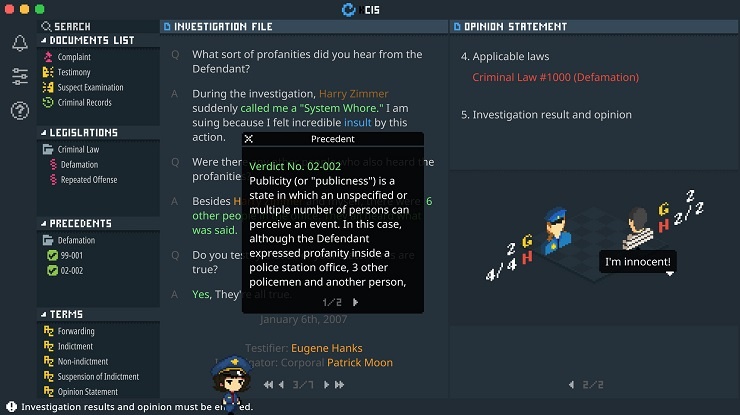Legal Dungeon puts you in the nitty-gritty of filling out Korean police reports, having you using legal precendent and laws to build a case against suspected criminals.
There’s no arguing back and forth. No clues to collect. No witnesses to interrogate. You have a case file, and within it, everything you need to build your case against the accused. It sounds like it sucks the glamour out of video game criminal investigations, but what it provides is depth. There’s no turning things around with a single piece of evidence or anything of the sort, but you taking every block of evidence and steadily creating your own case. You have to know, through and through, why your suspect is guilty if you’re going to get anywhere. That means research, knowing the right information, and knowing why it applies in your case.

My case at BitSummit involved a man calling a cop a nasty police nickname. The suspect had done this in front of several other officers, and it seemed like a rather simple case. Still, I had to get all of my information together if I was going to forward this along for charges. To do that, I had to read through witness testimony, case logs, and the legal precedents that would make my case. It was complex stuff, but given that the game is built to closely model police paperwork filing in Korea, it should be.
That complexity only made it more interesting. Finding the right information I needed to make my case felt more like actual police/detective work rather than finding the correct narrative beat that would progress a fictional drama. Not only this, but the game does an excellent job of teaching you how to do this challenging work, with a little desktop assistant offering some guidance on what information goes where in this initial stage. The actual play was made straightforward and simple, leaving me with the challenges around proving my case.

That step was far from easy, even in this first stage. I had witnesses and what I thought was a clear crime, buyt what was the crime that was committed? I had to research precedent to prove this slander, and even when I found the right law, the suspect proved to be slippery, forcing me to show how their statement met the legal criteria to be slander. This meant poring over the exact details of what went down yet again, finding the bits and pieces that locked in my accusation. This was presented in a turn-based RPG-like battle, and it came down pretty close as I struggled to nail that final proof.
The nuances of the law are explored in great detail in Legal Dungeon, offering an exceptionally interesting mystery for players to solve. This was done while providing an interesting look into the paperwork of law enforcement officers, which created some rich complexities. Still, the game’s not just interested in having you fill out police paperwork, as it also offers a look into how this kind of legal wrangling can be abused by the officers in charge of it.
That Legal Dungeon was created by a Korean police officer gives it a great weight and credibility, offering a rewarding experience alongside some scathing criticism. It’s a deeply rewarding mystery game that challenges mystery and crime game lovers in unique ways, and looks to make players consider the potential for cruelty and false accusations that can come from everyday police work. With its compelling message and new, complex spin on crime games, it was the best game we played at BitSummit 7 Spirits.
Legal Dungeon is available now on Steam.

